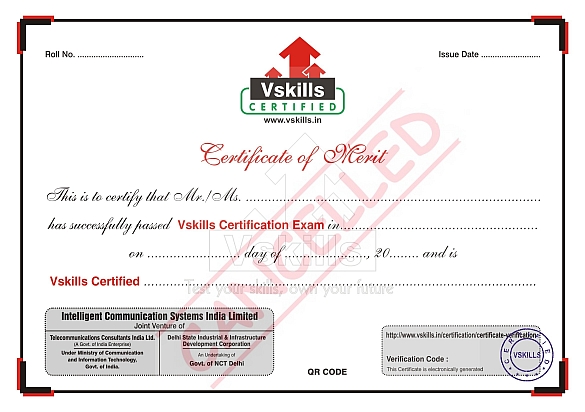- Duration / Course length: 1 To 2 Months Start now
- Certificates:
- Course delivery: This course is delivered in video format
Course details
Vskills certification in Merger and Acquisitions provides a brief overview of the techniques and practice involved in the process of merger and acquisitions. The purpose of the certification is to bring about an understanding of how mergers and acquisitions work. The certification asses the candidates on the basis of the rationale to select acquisition targets, valuation and capability to handle complex process such as identifying acquisition strategies, closing the deal and thinking through integration issues etc. Practicing mergers and acquisitions requires a strong proficiency in accounting, finance and business acumen.Why should one take this certification?
The certification exam helps working professionals in improving skills and getting better equipped for the job or for the purpose of proving the employer that you posses the skills required to perform the task. The certification helps build your CV and acts as an additional qualification that significantly improves your chances of getting the desired role.
Who will benefit from taking this certification?
Job seekers looking to find employment in the field of M&A of various companies, students generally wanting to improve their skill set and make their CV stronger and existing employees looking for a better role by proving their employers the value of their skills through this certification.
Companies that hire Vskills Merger and Acquisition Analyst
Vskills Certified Merger and Acquisition Analyst might find employment in all kind of companies, big or small, playing important roles in providing strategic and operational guidance. The certified candidates may get hired as consultants to companies or investment banks to acts as intermediary to broker a deal or serve as an advisor either to the acquirer or the target company, and may also help in financing a deal.
Table of Contents
Introduction to M & A
- Understanding Key terms
- Motivation behind M&A
- Fundamental of M&A
- Types of M&A Deals
- Stages in M&A
- Challenges of M&A deals
- Selling Process and Decision Path
- Preparing for sale
- Preparation mistakes
- Understanding seller’s objective
- Post closing plans
- Building the team
- Designing acquisition plan
- Approaching for sale
- Dealing with the seller
- Meaning and Scope of restructuring
- Modes of corporate restructuring
- Planning, formulation and execution of corporate restructuring strategies
- Risk Management
- Assumption Management
- Dependency Management
- Quality Management
- Cost Management
- Stakeholder Management
- Communications Management
- Issue Management
- Companies Act, 1956
- Competition Act, 2002
- Foreign Exchange Management Act, 1999
- SEBI Takeover Code, 1994
- Indian Income Tax Act, 1961
- SEBI (Buy-back of Securities) Regulations, 1998
- SEBI (Substantial Acquisition of Shares and Takeovers) Regulations, 1997
- SEBI (Delisting of Securities) Guidelines, 2003
- Trends and Pattern
- Reasons for Cross border deals
- Intensity of cross border deals
- Value involvement and route of acquisition
- Inbound and Outbound Cross Border M&A
- Concept and modes of demerger
- Demerger and voluntary winding up
- Procedural aspects of reverse merger
- Tax aspects and relief’s policies
- Process and organization for due diligence
- Types of Due diligence
- Key concepts of pricing
- Valuation overview
- Factors influencing valuation
- Methods of valuation
- Challenges in valuation
- Financial alternatives
- Funding through financial instruments
- Funding through Financial institutions
- Takeover strategies
- Styles of negotiation
- Negotiation Process
- Resistance strategies
- Change Management
- Integration Planning
- Integration Success
- Team Review
- Post-deal audits
- Role of advisors
- Staffing issues
- Corporate culture
- Corporate Identity
- Postmerger key lessons





